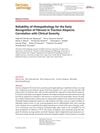 12 citations,
March 2016 in “BBA clinical”
12 citations,
March 2016 in “BBA clinical” Increased Toll-like receptors in blood cells may contribute to alopecia areata and could be a target for new treatments.
[object Object]  8 citations,
March 2021 in “Medicina-lithuania”
8 citations,
March 2021 in “Medicina-lithuania” PRP treatment may promote hair growth and improve hair density in women with AGA, but more research is needed.
 8 citations,
December 2018 in “Journal of Dermatological Treatment”
8 citations,
December 2018 in “Journal of Dermatological Treatment” The PRP-like cosmetic with biomimetic peptides is potentially effective and safe for treating alopecia areata.
 7 citations,
October 2018 in “Dermatology practical & conceptual”
7 citations,
October 2018 in “Dermatology practical & conceptual” Topical oxygen therapy may improve treatments for hair loss, acne, and chronic skin diseases with minimal side effects.
 5 citations,
June 2019 in “Dermatopathology”
5 citations,
June 2019 in “Dermatopathology” Histopathology is not reliable for detecting early fibrosis in traction alopecia or for showing how severe it is.
 4 citations,
April 2018 in “Journal of Investigative Dermatology”
4 citations,
April 2018 in “Journal of Investigative Dermatology” Hydroxypinacolone retinoate is a potent anti-aging ingredient for skin that is more effective and less irritating than other forms of retinoids.
 3 citations,
April 2019 in “Journal of Dermatological Treatment”
3 citations,
April 2019 in “Journal of Dermatological Treatment” Caffeine shows promise for treating some types of hair loss, but more research is needed.
 2 citations,
December 2019 in “Journal of Dermatological Treatment”
2 citations,
December 2019 in “Journal of Dermatological Treatment” Metabolic syndrome reduces effectiveness of hair loss treatment.
[object Object]  1 citations,
June 2018 in “Advances in Cosmetic Surgery”
1 citations,
June 2018 in “Advances in Cosmetic Surgery” PRP might help with hair growth and skin rejuvenation, but more research is needed to prove its effectiveness.
 1 citations,
May 2017 in “InTech eBooks”
1 citations,
May 2017 in “InTech eBooks” Some natural remedies may help with hair regrowth, but more research is needed to confirm their effectiveness and safety.

Monthly PRP therapy is more effective than daily minoxidil for alopecia areata.
 February 2024 in “Sohag Medical Journal”
February 2024 in “Sohag Medical Journal” Various local treatments for alopecia areata show promise, but individualized plans and more research are needed.
 January 2024 in “Regenerative Biomaterials”
January 2024 in “Regenerative Biomaterials” Dissolvable microneedles with Ginsenoside Rg3 can help treat hair loss by improving drug delivery and stimulating hair growth.
 August 2023 in “International journal of research in Ayurveda and pharmacy”
August 2023 in “International journal of research in Ayurveda and pharmacy” Garudan Kizhangu Ennai may effectively treat alopecia areata but needs more research to confirm its safety and effectiveness.
 July 2023 in “The Egyptian Journal of Hospital Medicine ”
July 2023 in “The Egyptian Journal of Hospital Medicine ” Alopecia areata is a hair loss condition caused by immune factors and can be treated with JAK inhibitors.
 August 2021 in “Journal of emerging technologies and innovative research”
August 2021 in “Journal of emerging technologies and innovative research” PRP combined with Ayurvedic medicine may effectively treat hair loss.
 September 2018 in “The Medical Journal of Cairo University/The Medical Journal of Cairo University”
September 2018 in “The Medical Journal of Cairo University/The Medical Journal of Cairo University” Polarized light therapy helps hair regrowth in alopecia areata patients.
 April 2018 in “Journal of Investigative Dermatology”
April 2018 in “Journal of Investigative Dermatology” Older hair follicle stem cells have a reduced ability to renew themselves, leading to more hair loss.
 April 2018 in “Journal of Investigative Dermatology”
April 2018 in “Journal of Investigative Dermatology” Both Th1 and Th2 immune responses are increased in alopecia areata, with Th2 response more strongly linked to how severe the disease is.
 January 2017 in “Springer eBooks”
January 2017 in “Springer eBooks” The document explains various skin conditions and their treatments.
 25 citations,
March 2018 in “Clinics in Dermatology”
25 citations,
March 2018 in “Clinics in Dermatology” Indigenous herbal medicines in the Indian subcontinent have potential for drug development but need more research and standardization.
 4 citations,
August 2013 in “Expert Review of Dermatology”
4 citations,
August 2013 in “Expert Review of Dermatology” Updated treatments for female hair loss include minoxidil, antiandrogens, hair transplants, and light therapy.
 3 citations,
May 2023 in “Precision clinical medicine”
3 citations,
May 2023 in “Precision clinical medicine” Researchers found four genes that could help diagnose severe alopecia areata early.
 2 citations,
January 2019
2 citations,
January 2019 The document concludes that autoimmune skin disorders are treated with corticosteroids and immunosuppressive drugs.
 November 2023 in “Klìtinna ta organna transplantologìâ”
November 2023 in “Klìtinna ta organna transplantologìâ” MSC-derived exosomes can help treat COVID-19, hair loss, skin aging, and arthritis.
 November 2020 in “Bali Medical Journal”
November 2020 in “Bali Medical Journal” PRP may help hair growth in alopecia areata without major side effects, but more research is needed.
 August 2020 in “Revista de chimie”
August 2020 in “Revista de chimie” Nitroglycerin ointment is now used to treat several skin conditions with fewer side effects.
 January 2019 in “Springer eBooks”
January 2019 in “Springer eBooks” Modified HDL can better deliver drugs and genes, potentially improving treatments and reducing side effects.
 236 citations,
July 2001 in “Trends in Molecular Medicine”
236 citations,
July 2001 in “Trends in Molecular Medicine” Future hair loss treatments should aim to extend hair growth, reactivate resting follicles, reverse shrinkage, and possibly create new follicles, with gene therapy showing promise.
 106 citations,
March 2014 in “BioEssays”
106 citations,
March 2014 in “BioEssays” We need more research to better understand human hair follicle stem cells for improved treatments for hair loss and skin cancer.





























